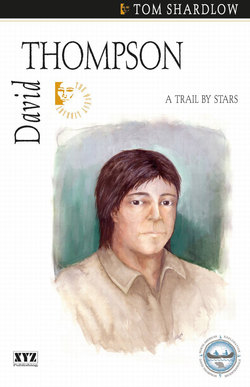Читать книгу David Thompson - Tom Shardlow - Страница 16
ОглавлениеWithin ten days the Prince Rupert was loaded and ready for London. She could not delay. A cold arctic front was blowing its icy breath over the river. Northward, sea ice was already starting to block navigation out of Hudson Bay. From the rocky headland, David watched Prince Rupert’s longboat tow her into the out-flowing current where the ship drifted quietly downstream to the sea. My ship could be off Dover’s white cliffs , he thought, within the number of weeks counted on one hand, but I’ve no chance of leaving this place for seven years at least, maybe never. When the Prince Rupert was finally out of sight, he felt he had lost all hope of contact with England, with his school friends, with his childhood.
He wandered back to the unfurnished bunkhouse and pulled a rough wool shirt from under the wooden planking of his new bed. The morning sun seemed to give him little warmth, and he buttoned on another layer under his coat and joined his new workmates, two company clerks, who were collecting firewood. The three of them had been scouring the river for days, hauling driftwood up the bank, chopping it into stove-size pieces, and stacking it inside the factory’s stockade, which was nearly four metres high. Wood was scarce. Over one hundred years of occupation at the fort meant even the smallest of the stunted trees had been stripped away. The already naked landscape had become lunar-like, emptied of all wood and scrub. The river floated a fresh supply of driftwood downstream each week, but that was still not enough, and the work parties trudged many kilometres each day in search of more firewood.
For David, the weary chore of wood collecting was interrupted only by joyless clerical duties. With ink and quill he made entries into the Hudson’s Bay Company ledger: 7 forks, 12 balls of twine, 118 small bags of gunpowder, 20 eight-lb. bags of bird-shot, 4 one-lb. packets of salt, and on it went until every item in the multitude of items unloaded from Prince Rupert were packaged and stored into the company’s inventory.
Pelts of muskrat, fox, and beaver brought in by Chipewyan trappers would be exchanged according to strict standards established in London. One blanket had the trade value of forty muskrat, or two black fox, or seven prime beaver. The post’s chief trader, called the factor, added his own markup, which in some cases doubled the number of furs required by London for a trade item. This was called the Factor’s Standard. Each night the inventory from the previous day’s trade was tallied and recorded in the company’s books. The factor’s take was recorded in a separate book.
“Still at it this late at night?” a voice called through the storeroom door as David sat reading a borrowed book. Through the dark room he watched a slim-built man approach and reach his open hand into the dim light surrounding David’s candle.
“Hello. I’m Hodges, company surgeon, pleased to make your acquaintance.”
